Search results
Projects
Pet Playing for Placemaking
Designing playful technologies for social engagement and healthy ageing
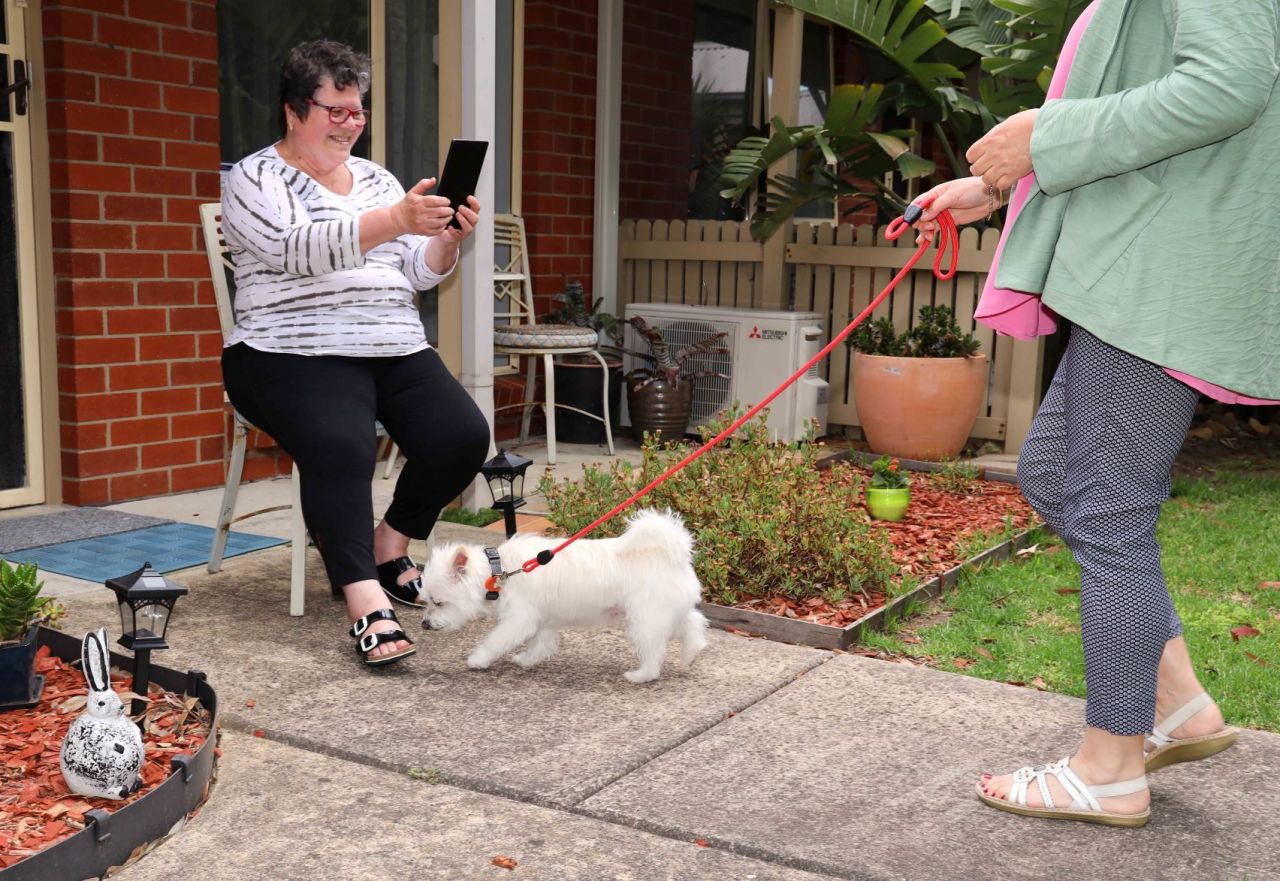
With many pet owners experiencing social isolation during the pandemic, RMIT researchers are collaborating with Cherished Pets Foundation and its affiliated veterinary social enterprise towards improving social inclusion in the local community. The initiative has received community funding to bring an interactive, playful, and creative spin through a game designed to promote social engagement and healthy ageing.
Pet Playing for Placemaking Survey Report — October 2020
2021 Give Where You Live Community Connections Grant
If you would like to get involved with this project, fill out the form below or reach out to project leaders via the contact info provided alongside each bio.
People
Larissa Hjorth
Distinguished Professor and Director, Design and Creative Practice
School: Enabling Capability Platforms
Larissa Hjorth is a digital ethnographer, artist, Distinguished Professor and director of the Design & Creative Practice ECP platform at RMIT University. With Professor Heather Horst, she co-founded the Digital Ethnography Research Centre (DERC). Previously, Hjorth was Deputy Dean, Research & Innovation, in the School of Media & Communication (2013−2016). Hjorth served on the inaugural Australian Research Council (ARC) Engagement & Impact Pilot study assessment panel for humanities and creative practice.
Hjorth studies the socio-cultural dimensions of mobile media and play practices in the Asia-Pacific region with an emphasis on interdisciplinary, collaborative and cross-cultural approaches. She has published a dozen co-authored books, edited over a dozen Handbooks/Companions and has over 40 journal articles.
More recently, Hjorth’s work has become concerned with how we can bring creative, social and design solutions to the growing ageing populations and, in turn, how we might consider scenarios of what it means to die well. She is also studying how our “more-than-human” companions can teach us about new media in everyday life. Hjorth’s last book, Haunting Hands (Oxford Uni Press) looked at how mobile media is being deployed in situations of grief and trauma, her previous book explored how art practice can teach us new acumen into the climate change debate.
Hjorth’s books include Haunting Hands (with Cumiskey 2017), Screen Ecologies (with Pink, Sharp & Williams 2016), Digital Ethnography (Pink et al. 2016) Mobile Media in the Asia-Pacific (2009), Games & Gaming (2010), Online@AsiaPacific (with Arnold 2013), Understanding Social Media (with Hinton 2013), and Gaming in Locative, Social and Mobile Media (with Richardson 2014).
Jacob Sheahan
PhD Candidate
School: School of Design
0424056233
Personal website
jacob.sheahan@rmit.edu.au
Currently undertaking a PhD in Design at RMIT School of Design, Jacob explores socially engaging technology in later life and its shaping by designers. Approaching design research through investigating the materiality of artifacts, and our interactions with them, Jacob seeks to uncover social-technical practices through dialogical and anthropological means.
Alongside his doctorate research, Jacob is involved in ‘Co-designing Participatory Strategies With Older Adults ‘ (Shaping Connections) and ‘Enabling an Ageing Workforce’ (Safeness by Design) research projects. As a sessional lecturer in Design Studies, Jacob hopes to foster research-led and collaborative design practices in socially complex contexts. With a diverse background in the design industry, he is interested in locating design research practice in wider discourses and interrogating its impact.
Rainbow Ranges
Co-creating digital tools for vitalism with LGBTQI+ youth
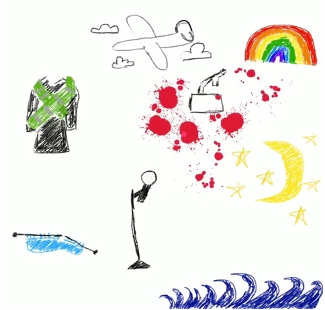
This pilot study set out to disrupt the dominant understandings of queer youth centred on narratives of vulnerability and distress.
Working with LGBTQI+ youth based in regional Victoria, Rainbow Ranges investigated how these young people understood and experienced vitality and aliveness through a series of creative arts-based workshops. The project team and young people co-created a concept for digital intervention to promote a sense of belonging, foster social connections, and improve the wellbeing of LGBTIQ+ identifying individuals and communities.
If you would like to get involved with this project, fill out the form below or reach out to project leaders via the contact info provided alongside each bio.
People
Anne Harris
Associate Professor and Principal Research Fellow, Design and Social Context
School: Education
+61 3 9925 4459
RMIT staff profile
anne.harris@rmit.edu.au
Dr Anne M. Harris, PhD is an Associate Professor and Vice Chancellor’s Principal Research Fellow at RMIT University, and an Australian Research Council Future Fellow (2017 – 2021) studying intercultural creativity. Anne is an Honorary Research Fellow at University of Nottingham (UK) and an Adjunct Professor at Monash University (Australia).
Their research is in the areas of gender, creativity, diversity, performance and emerging digital ethnographies. Anne is a native New Yorker and has worked professionally as a playwright, teaching artist and journalist in the USA and Australia. They have authored or co-authored over 60 articles and 13 books on creativity, arts, and non-dominant culture formations, the latest being Queering Families/Schooling Publics: Keywords (with Stacy Holman Jones, Sandra Faulkner, and Eloise Brook, Routledge 2017). Anne is the creator and series editor of the Palgrave book series Creativity, Education and the Arts, and recently completed an Australian Research Council DECRA on the commodification of creativity.
Troy Innocent
VC Research Fellow
School: School of Design
Dr Troy Innocent is an artist, academic, designer, coder, educator, and VC Senior Research Fellow at RMIT University, where his creative practice research explores the city as platform for play through an inventive blend of live art, game design and public art. Over the past ten years he has explored the lived experience of cities through mixed realities; situating his work in Melbourne, Bristol, Barcelona, Istanbul, Ogaki, Sydney and Hong Kong. As Melbourne Knowledge Fellow, Innocent expanded his ‘urban codemaking’ practice for situating play in cities to develop Playable City Melbourne, a three-year project bringing together an interdisciplinary urban play community. He is currently artistic director of 64 Ways of Being, a playable city-wide platform for augmented reality experiences supported by a Creative State Commission.
Katherine Johnson
Professor
School: Social and Global Studies
Professor Katherine Johnson is Director of the Social and Global Studies Centre at RMIT University.
Katherine has been a visiting professor in gender studies at the University of Sydney, Australia (2007), in social psychology and psychosocial interventions at Universitat Autònoma de Barcelona (2009−2012), in participatory-action research and LGBT health inequalities at the Universidade Federal de Sao Paulo, Brazil (2016) and the Universidad de Colima, Mexico (2016). She is currently Visiting Professor at the University of Brighton, UK where she previously established the Division of Applied Psychology & Psychotherapy and the Centre for Research Excellence, Transforming Sexuality and Gender.
Her research is in the field of gender, sexuality and mental health, with specialisms in critical community psychology and psychosocial studies, qualitative, participatory and visual research methods, and interdisciplinary research about LGBTQ lives. Her research collaborations and partnerships focus on improving the lives of LGBTQ+ people and have impacted on social policy and practice, particularly in the field of suicide prevention, mental health and end of life care.
Katherine is an Associate Fellow of the British Psychological Society, Past Chair of the Psychology of Women and Equalities Section, and a member of the World Professional Association for Transgender Health (WPATH). She is on the Editorial Board of Feminism and Psychology and Feminist Encounters: A journal of critical studies in culture and politics. She is also series editor with Professor Kath Browne (Maynooth, Ireland) of the Routledge book series, Transforming LGBTQ Lives. Katherine has served as a panel member for the ESRC Global Challenges Research Fund on global mental health, UK and the Irish Research Council.
Creative Ecologies
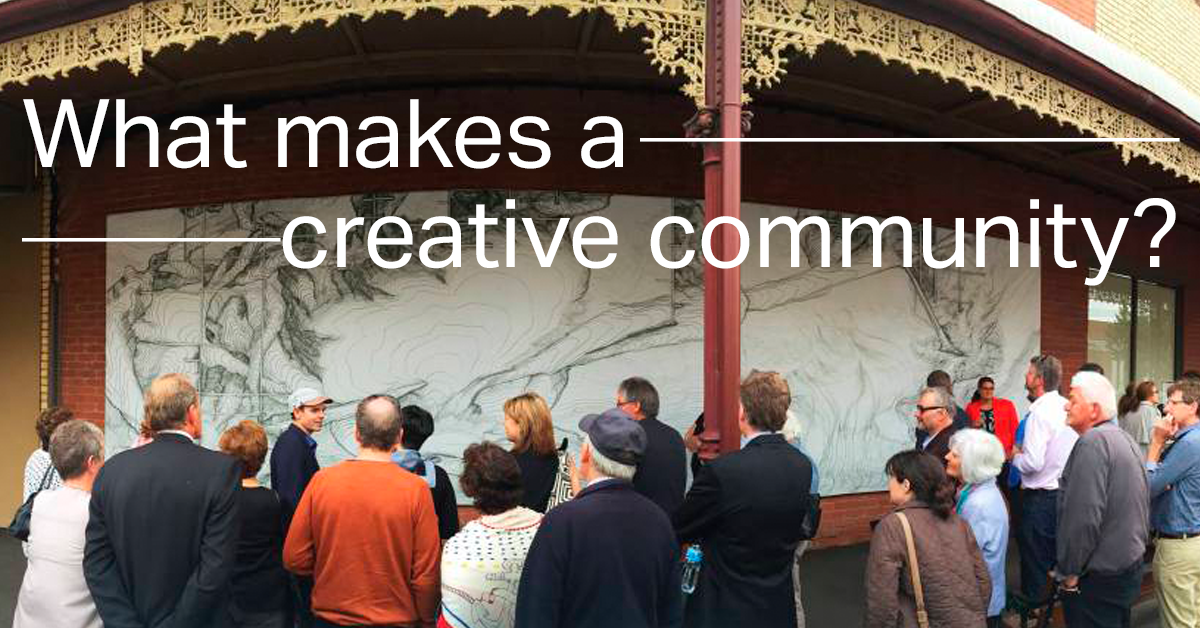
Creative Ecologies is a collaborative investigation into what makes Australia’s creative landscapes tick. The aim is to understand what it takes to build thriving creative communities and then develop tools to foster their growth.
The goal of the project is to develop a simple way of articulating the complex ways creative ecologies operate. Core to this will be highlighting connections to the wider society and demonstrating value beyond purely economic indicators. The long-term ambition of Creative Ecologies is to expand our understanding and appreciation of creative exertion – and have its central place in Australia’s national character recognised. It will do this by developing and raising awareness of a framework and resource for policymakers, practitioners and advocates. This will be a live, interactive visual map of the nation’s creative ecologies, combining data, case studies and avenues for connection across the sector.
The project began in late 2017 and the arising work and findings including a national survey, one-on-one consultations, interactive workshops were presented at the Engaging For Impact conference in February 2018. Creative Ecologies now has an expanded list of RMIT researchers on board
LEAD RESEARCHER
○Jan van Schaik, Senior Lecturer, School Architecture & Urban Design
SUPPORTING RESEARCHERS
○Marnie Badham, Vice Chancellor’s Postdoctoral Fellow, School of Art
○Bronwyn Coate, Senior Lecturer, Economics, Finance and Marketing
○Gretchen Coombs, Postdoctoral Fellow, DCP ECP
○Christine Phillips, Senior Lecturer, Architecture & Urban Design
○Professor Jason Potts, Economics, Finance and Marketing
○Noel Waite, Senior Lecturer, Communication Design
○ Professor Ellie Rennie, Digital Ethnography Research Centre
○Professor Mark Sanderson, Computer Science and Information Technology
You can find out more about CREATIVE ECOLOGIES here.
If you would like to get involved with this project, fill out the form below or reach out to project leaders via the contact info provided alongside each bio.
People
Jan van Schaik
Senior Lecturer
School: Architecture and Urban Design
Jan van Schaik is a practising architect at MvS Architects, a researcher and senior lecturer at RMIT Architecture & Urban Design, and a creative and cultural industries strategist at Future Tense. His is the leader of the ‘Culture and Society’ research stream, and a PhD superrvisor of established architects conducting post-professional reflective practice research. Jan is the founder of the WRITING & CONCEPTS lecture and publication series which reflects of the role that writing plays in visual arts practice. Jan is also one of the founders of Creative Ecologies„ a collaborative investigation into what makes Australia’s creative landscapes tick. The aim is to understand what it takes to build thriving creative communities and then develop tools to foster their growth.
Developing Game Regions
Exploring regional growth in game cultures and gaming industries in Vietnam
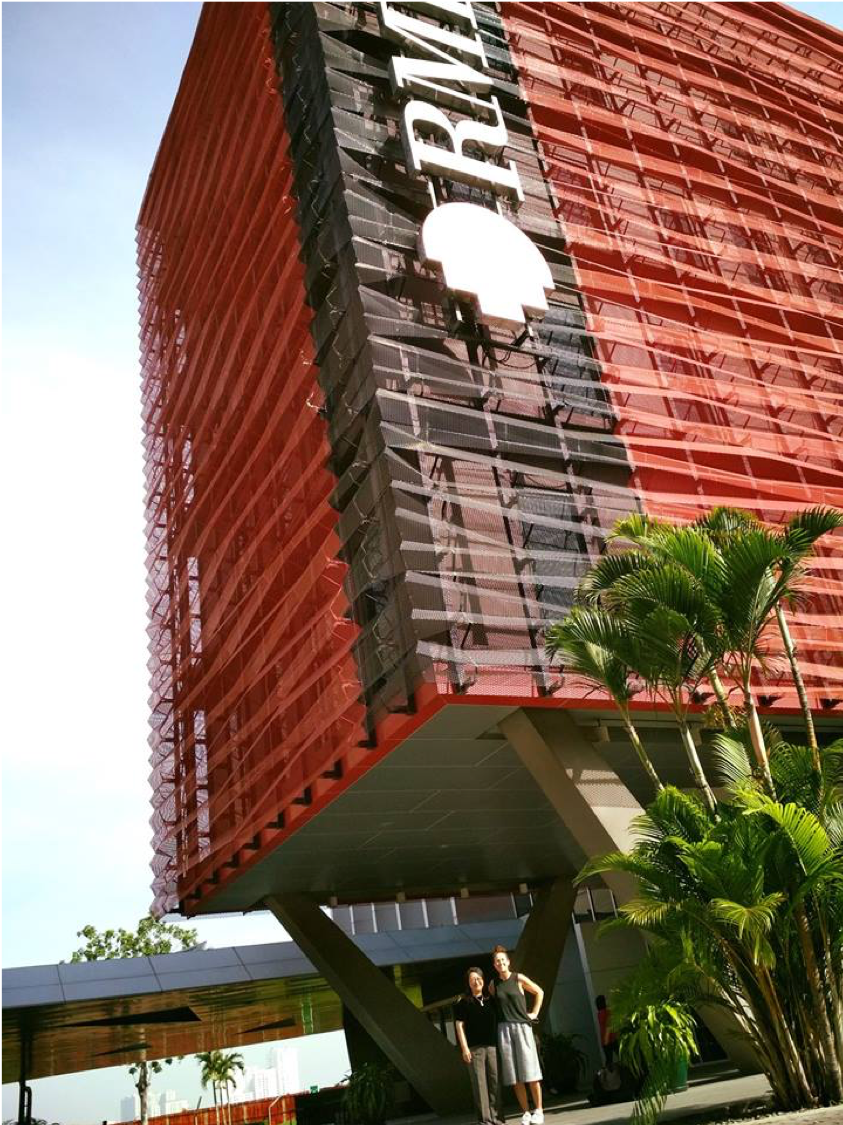
The Developing Games Regions project aims to establish games industry connections and research partners within SE Asia-Oceania. As a thriving sector in SE Asia, this project explores gaming industries in Vietnam. Over 33.9 million people play games in Vietnam, but little is known about these game cultures. RMIT is in a unique position to cultivate enduring relationships with Vietnamese gaming industries as research partners, and cross-institutional scholarship by connecting with leading games experts in SE Asia. Strengthening relationships between RMIT Melbourne/Vietnam, local industries and regional expertise enhances the potential to address the Vietnamese games industry as an emerging market for production and play.
If you would like to get involved with this project, fill out the form below or reach out to project leaders via the contact info provided alongside each bio.
People
Emma Witkowski
Senior Lecturer, Digital Design Cluster
School: Games
+61 3 9925 4756
Personal website
emma.witkowski@rmit.edu.au
Dr Emma Witkowski is the Director for Playable Media and a Lecturer in the School of Media and Communication. As the Program Manager for the Bachelor of Games Design degree, Witkowski teaches theoretical units on Game Cultures and Game Studies.
Witkowski received her PhD in Game Studies in 2012 from the IT University of Copenhagen, Denmark, taking a qualitative exploration of networked high performance play, considered through a lens of sociology and phenomenology, sports and game studies. She has been working in the field of computer game cultures since 2005, the same year she co-founded the Danish state and privately funded initiative Letzplay, a project aimed at increasing young women’s access to ICT’s and computer gaming knowledge.
Her current research looks at various aspects of computer game cultures, including high performance networked teamplay, esports, gender and games and serious leisure practices. She has written and presented on topics such as identity and play, livestreaming and spectatorship, Mega-LANs, running aesthetics, and the phenomenology of high-performance networked teams.
Doubting Writing/Writing Doubt
Expanded writing program

This project brought together writers of diverse disciplinary and creative backgrounds to explore new methodologies for arts writing and criticism in response to the exhibition On Vulnerability and Doubt at ACCA. Following a public call-out, that attracted over 60 applicants, ten writers were selected to participate in a series of workshops, a public readings event and to co-design a digital publication.
Doubting Writing/Writing Doubt took the exhibition themes of doubt and vulnerability as provocations from which to write about art. It built on the success of 2018’s Writing in the Expanded Field, which explores diversification in contemporary critical writing.
The project was a great success, attracting excellent applicants, high public interest, connections with the arts publishing industry, and firmly consolidating the partnership between non/fictionLab and ACCA.
Digital Publication
ACCA Program Page
Podcast of Public Readings Event
If you would like to get involved with this project, fill out the form below or reach out to project leaders via the contact info provided alongside each bio.
People
Lucinda Strahan
School: Media and Communication
Lucinda Strahan is a writer and researcher of expanded nonfiction. Lucinda’s own expanded writing practice spans journalism and arts criticism, auto-ethnographic and personal essaying, editing and publishing, and exploratory literary-visual methods. She is the currently Writer in Residence at Linden New Art, St Kilda and in 2017 was Writer in Residence Residence at Grey Projects, Singapore as part of her ongoing interest in interdisciplinary critical/creative writing practices. Lucinda is a Lecturer in the Professional Communication program in the School of Media and Communication.
FoodCHI 2017
Technologically enabled food futures
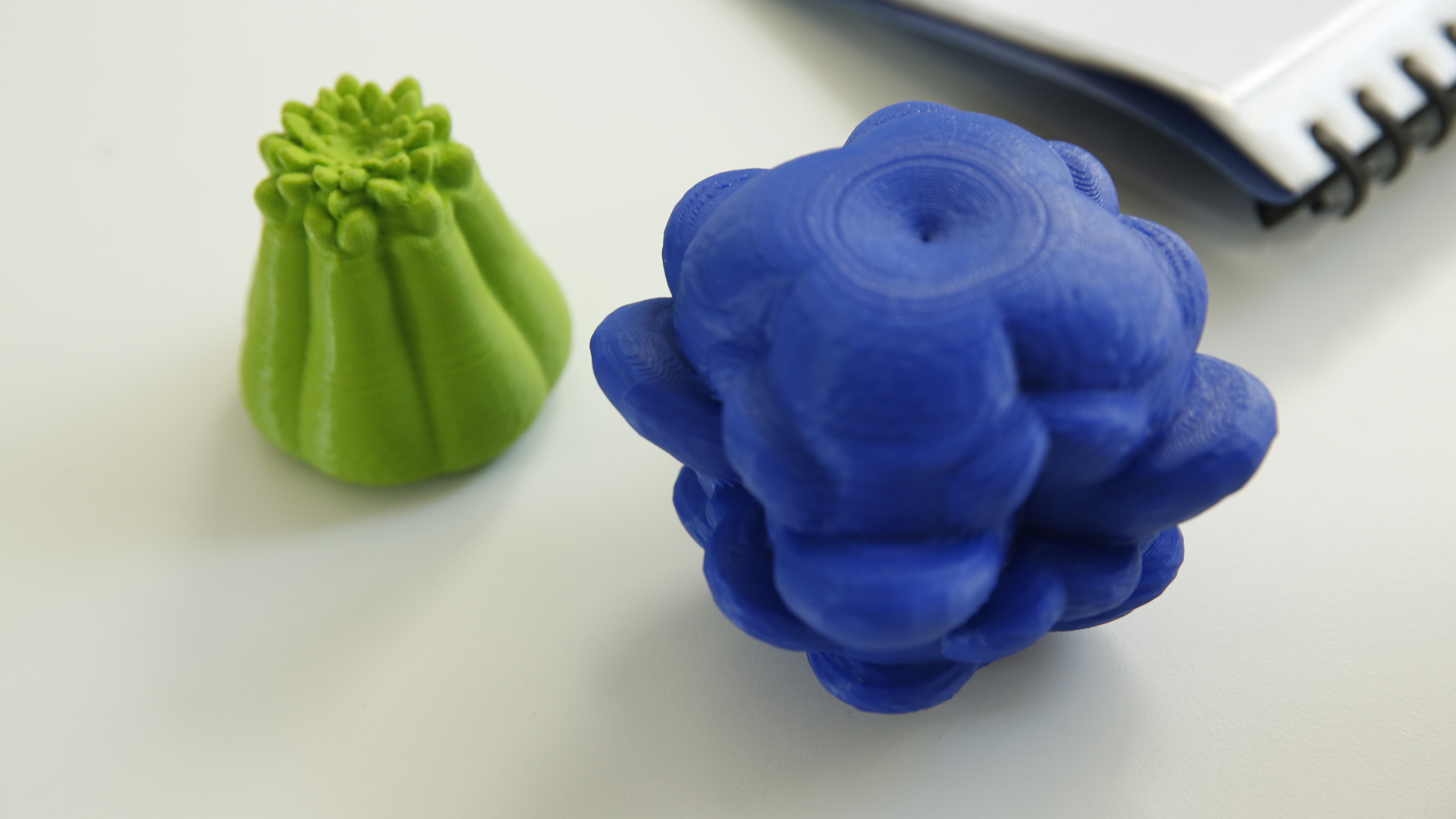
How does design and technology impact food futures? FoodCHI (Computer-Human Interaction) brings together experts and innovators across design, digital media, technology, art, sociology, and food. We examine the role of design and technology in shaping of future foodscapes and work with industry to chart robust approaches for technologically enabled food futures.
Visit the FoodCHI website.
If you would like to get involved with this project, fill out the form below or reach out to project leaders via the contact info provided alongside each bio.
People
Rohit Ashok Khot
Postdoctoral Fellow, Digital Design Cluster
School: Games
+61 3 9925 2594
Personal website
rohitashok.khot@rmit.edu.au
Dr Rohit Ashok Khot is the Deputy Director of the Exertion Games Lab; and Vice-Chancellor’s Postdoctoral Fellow at RMIT University, Australia. Rohit’s research embodies interdisciplinary strength and explores the amalgamation of design and technology in a creative way.
Dr Khot’s track record includes 39 scholarly publications in last 7 years, the majority of which appear in highly competitive HCI conferences and journals and include one best paper and one honorable mention (top 5%) award. Dr Khot’s research also appeared on 30+ press articles including a cover story on Mashable Australia, IEEE Spectrum and TV coverage on Channel 9 News and ABC News 24. He has won prestigious awards including IBM PhD fellowship (2014−2015), 2017 RMIT HDR Prize for Research Excellence (2017), RMIT Vice-chancellor’s Postdoctoral Research Fellowship (2017−2019) and SIGCHI Development Fund Grant (2017,2018). Dr Khot is also involved in organization and management of the Special Interest Group meetings, workshops and symposiums at leading international conferences specifically around food and play, besides serving on program committees for leading international HCI conferences, including DIS and TEI.
Rohit is passionate about playful Human-Food Interaction (HFI) and has an ambitious goal to alter the common perception that food cannot be healthy and pleasurable at the same time.
Gamified Research Translation (GREAT)
Where business research meets gamification to create impact
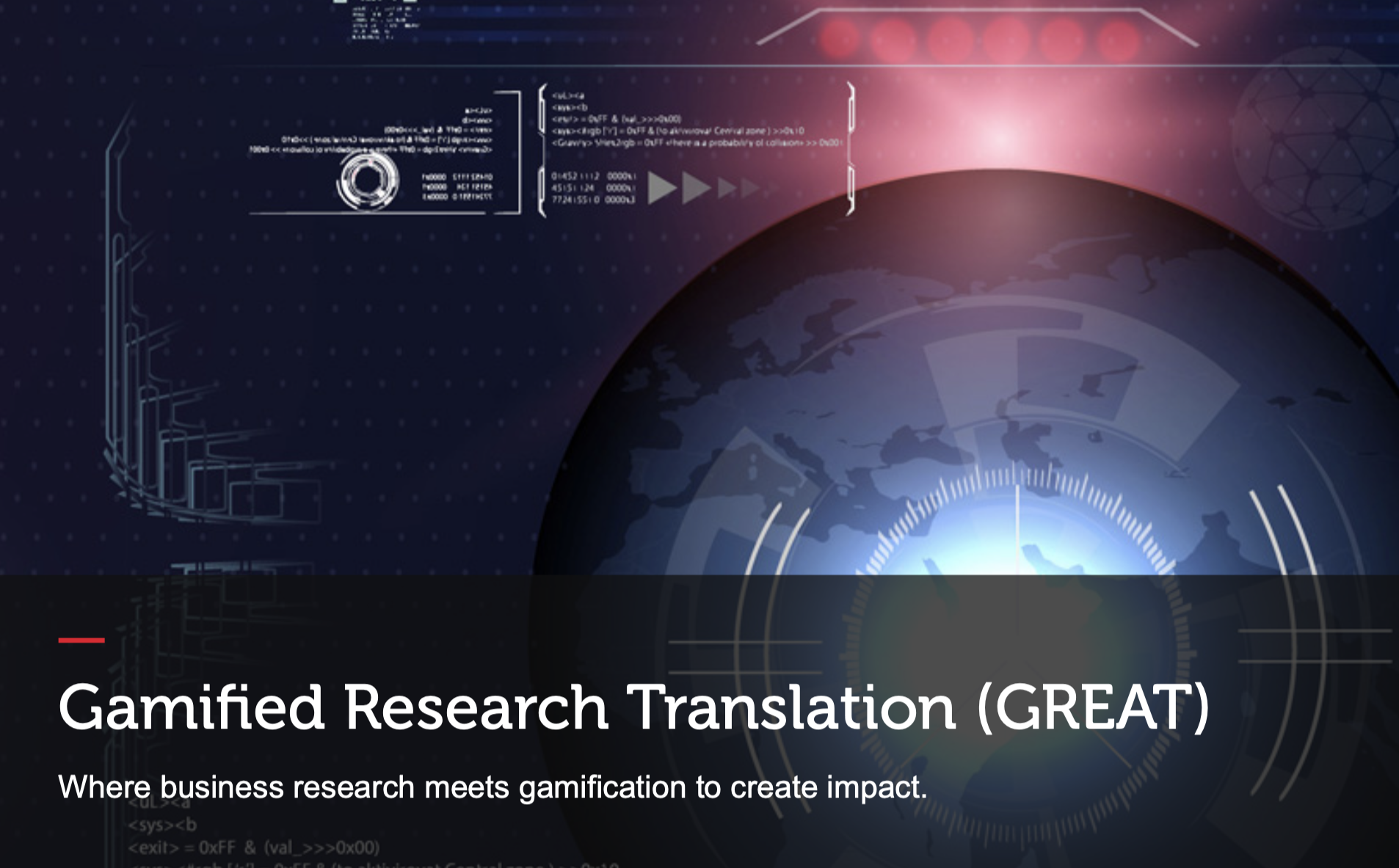
The GREAT challenge
During the last decade, games have become a common part of people’s daily lives. Digital promise of Ed Tech and growing research on gamification has drawn attention to translation of valid science-based research for capability development. Activities and outputs that are not traditionally perceived as game-like are increasingly gamified.
In its most basic form, business research translation with gamification involves multi-disciplinary tasks of taking research findings, human psychology and technology of game-design, and applying them to business contexts — to achieve impact through change in behavior, cognition or emotional states.
However, current business research translation activities tend to rely on traditional academic outputs which may not deliver the intended societal impact — a challenge highlighted at local and international level.
The GREAT mission
Increase awareness and knowledge on gamification of business research. To encourage researcher-industry integration to solve business challenges through games. To foster and deploy a cross-disciplinary network of GREAT experts, specialists and enthusiasts
The GREAT cause
GREAT serves as a catalyst and anchor for capability development and a forum for faculty, specialists and practitioners to develop coherent and collective thought leadership on how might we develop and implement game-based tools and gamification as the means of research translation to achieve societal impact.
The GREAT purpose
The purpose of GREAT is to catalyse meaningful inter-disciplinary knowledge exchange, develop best practices in gamification of business research and increase research-practice integration.
The GREAT call
We have embarked on a meaningful journey of shaping our collective future through gamification of business research.
We cannot do this alone – we need you – your expertise, your experience and your passion for the human side of business.
Find out more about Gamified Research Translation [GREAT] here.
If you would like to get involved with this project, fill out the form below or reach out to project leaders via the contact info provided alongside each bio.
People
Hardik Bhimani
PhD candidate
School: Economics, Finance and Marketing
Hardik Bhimani is a PhD student in the School of Economics, Finance and Marketing and is concurrently completing a Graduate Diploma in Psychology at Monash University. Hardik holds a Masters in Applied Finance from Kaplan Business School (Sydney) and is a member of the prestigious Strategic Management Society.
“Managers face many strategic decisions but they often make unsustainable choices. So the challenge for todays’ firms is – how to effectively make social, environmental and economic choices?”
Prior to joining RMIT, where Hardik currently teaches Strategic Management courses, he was an award winning strategist and subject matter expert at several multinational organisations. It was during this period that he cultivated a curiosity for behavioural strategy. Ultimately, the quest to advance his research found him a ‘home’ at RMIT University’s Behavioural Business Lab.
“The access to supportive supervisors and a team of like-minded critical thinkers means the research journey is not only pleasant, but also engaging.”
Hardik’s research aims to understand the micro foundations of the interplay between social, environmental and economic strategic choices. His mixed-method research takes a behavioural strategy perspective and explains psychological influences, which affect strategic decision-making. In turn, the findings could guide managers’ to effectively de-bias their decision-making process, for a more sustainable strategic choice.
The HASH Network
Interdisciplinary health research

The HASH (Health, Arts, Social sciences and Humanities) Network brings together collaborators from the social sciences, humanities, medicine, arts, and science and technology. It will draw on contributions from a wide range of academic researchers, health practitioners, health service users, and early career researchers. HASH aims to ignite creative connections and collaborations among members.
Visit the HASH Network website.
If you would like to get involved with this project, fill out the form below or reach out to project leaders via the contact info provided alongside each bio.
People
Renata Kokanovic
Convener, The HEALTH Network; Professor
School: Global, Urban & Social Studies
Professor Renata Kokanovic’s works at the intersections of health, society and medicine, with a particular focus on interdisciplinary mental health research.She combines empirical research with interdisciplinary theoretical and methodological scholarship while collaborating with industry partners and health care users to facilitate greater understanding of lived experiences of health and illness.
She co-founded Healthtalk Australia, a digital repository of health and illness narrative accounts designed to support people experiencing ill health, and inform health and social care delivery and policy.
Possum Skin Cloak Story
Reconnecting Communities and Culture
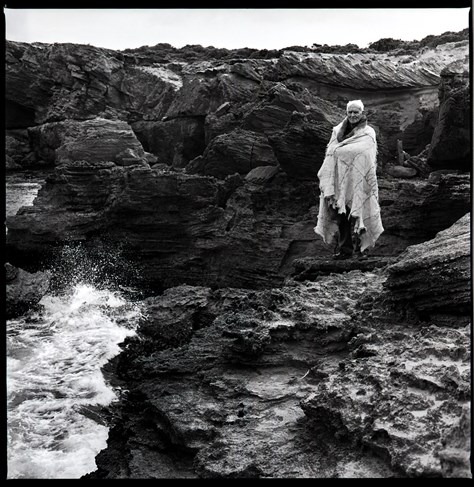
“Culture is the framework through which we connect to our Country, our Belonging. It defines and makes us who we are. Our language, stories, songs, dance, artefacts, cultural knowledge and practices demonstrate our continuing connections.” — Vicki Couzens.
Possum skin cloaks were a vital part of Aboriginal peoples lives in pre-European times. To make a cloak was a very labour intensive and time-consuming process. Telling the story of the Possum Skin Cloak strengthens cultural identity, connection to country and health, and education and justice within an indigenous community context. The impact of the revival of possum skin cloaks as a community cultural practice has been significant and profound.
If you would like to get involved with this project, fill out the form below or reach out to project leaders via the contact info provided alongside each bio.
People
Vicki Couzens
VC Indigenous Research Fellow
School: Design and Social Context
Dr Couzens is Gunditjmara from the Western Districts of Victoria. She acknowledges her ancestors and elders who guide her work.
Dr Couzens has worked in Aboriginal community affairs for almost 40 years. Her contributions in the reclamation, regeneration and revitalisation of cultural knowledge and practice extend across the ‘arts and creative cultural expression’ spectrum including language revitalisation, ceremony, community arts, public art, visual and performing arts, and writing. She is a Senior Knowledge Custodian for Possum Skin Cloak Story and Language Reclamation and Revival in her Keerray Woorroong Mother Tongue.
Vicki is employed at RMIT as a Vice Chancellors Indigenous Research Fellow developing her Project ‘watnanda koong meerreeng , tyama-ngan malayeetoo (together body and country, we know long time)’ The key objective of this Project is to produce model/s, pathways and resources for continuing the reinvigoration of Aboriginal Ways of Knowing Being and Doing with a special focus on language revitalisation.
News and updates
No results
People
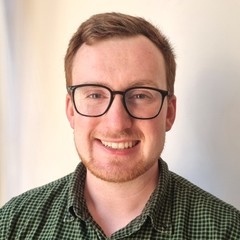
Currently undertaking a PhD in Design at RMIT School of Design, Jacob explores socially engaging technology in later life and its shaping by designers. Approaching design research through investigating the materiality of artifacts, and our interactions with them, Jacob seeks to uncover social-technical practices through dialogical and anthropological means.
Alongside his doctorate research, Jacob is involved in ‘Co-designing Participatory Strategies With Older Adults ‘ (Shaping Connections) and ‘Enabling an Ageing Workforce’ (Safeness by Design) research projects. As a sessional lecturer in Design Studies, Jacob hopes to foster research-led and collaborative design practices in socially complex contexts. With a diverse background in the design industry, he is interested in locating design research practice in wider discourses and interrogating its impact.
